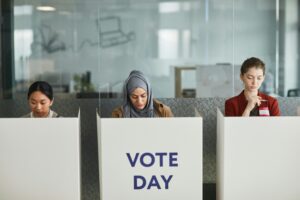Third Term Civic Lesson Note for JSS2
ACCESS ALL LESSON NOTES
ACCESS ALL QUESTIONS AND ANSWERS
ACCESS ALL WORKSHEETS
ACCESS ALL JOBS ACCESS
Week 2 & 3
Topic: Election and Voter’s Responsibilities
Introduction
In a community, everybody cannot lead. So there must be representatives who will give directives for others to follow. This has given rise to nominations and election of representatives that will direct the affairs of a particular community.
Election is simply defined as the process by which people are voted into power. It is the way of voting people to occupy political offices in order to serve the community or society for a particular period of time.
Election is the process by which people select or elect a candidate into an official position. It is usually carried out in a democratic system of government. Election is done through voting. Elections are conducted at definite intervals as spelt out in the constitution of the nation.
Voting is a method for a group, such as, a meeting or an electorate to make a decision or express an opinion, usually following discussions, debates or election campaigns. Residents of a place represented by an elected official are called “constituents”, and those constituents who cast a ballot for their chosen candidate are called “voters”.
Types of Election
There are different types of elections to elect leaders in a given community. These elections are:
Primary Election: Within a party, those to contest for a particular post like president, senators/ house of reps, governors, chairman etc are nominated within themselves. Primary election is the election that is held within the political party to choose the party representatives at the ward, constituencies, state or national level.
General Election: These types of elections are held at the same time all over the country. In the general election all the candidates that are presented by the parties for each post now come out to contest in the general election, in this election everybody stay within their area in the country to cast their vote.
Bye election: This is the type of election held to choose a candidate for a vacant post as a result of death or resignation of the former representatives. It is usually carried out in the ward or state where such happens.
Run-off election: This is the kind of election that is carried out when there is no candidate that wins the election as directed by the law. It takes place after no candidate earned a majority in an election.
Electoral College: This is an indirect system of election; it is the election in which the generality of the people vote to elect people who would in turn vote several times to elect the needed representatives.
Qualifications for Elections
There are basic qualifications for elections. These are
Anybody that must contest an election must belong to a registered political party
He must be an adult who is able to contribute to the welfare of the nation
Such an individual must have clean records within and outside the nation
He must be free from all bias, favouritism, ethnicity, preference.
He must be a person who is ready to serve and not a person who wants to be served
He must be a person of high intelligent quotient
He must be disciplined and be ready through example instill discipline to others also
A corrupt free individual
Assessment
Define the concept of election, voter and voting.
List five types of election
Week 4 & 5
Topic: Election Voters and Responsibilities (II)
Importance of Election
Election is important for the following reasons
To vote candidate of choice into power
To have a change of government
To make people participate in governance through their vote
To make people perform their political and civic right
To have a change of policy
To unseat the a government that is not performing well
Responsibilities of Voters
Every voter that wants the truth to prevail and wants good leadership must be ready to stand against all odds. Some responsibilities of a voters are
Be a vigilant and an enlightened citizen. Know what goes on around you
Reject corrupt political party and electoral officers
Reject all forms of gratifications before voting for a candidate
Cast your vote only for the sincere and disciplined candidates
Enlighten others who may not know the truth so as not to be victims of the dubious politicians
Be disciplined and have self control
Procedure for Voting
Voter’s Registration
Step 1: A Nigerian citizen who is eligible to vote, goes to the INEC website to locate his Polling Unit.
Step 2: The citizen goes to the chosen Polling Unit to register
Step 3: The citizen would have his/her picture taken and his/her details captured.
Step 4: The citizen would be given a Voter ID card which makes him/her eligible to vote on election day.
Election Day:
STAGE 1: Accreditation
Step 1: Go to the Polling Unit you were registered with your voter registration card ad join the queue
Step 2: Present your Voter registration card to the INEC official and ensure that your name is the register
Step 3: Your finger would be marked with ink to show that you have been accredited.
STAGE 2: Voting
Step 1: Join the queue with the intention of casting your vote
Step 2: When it gets to your turn, ensure your name is ticked in the voter register
Step 3: You would be given a ballot paper listing out the political parties
Step 4: Enter the booth and select your preferred candidate
Step 5: Place your ballot paper in the ballot box
Electoral Bodies
Electoral bodies are those who conduct and supervise election process. The constitution has provided for how election should be conducted. The body is called Independent National Electoral Commission (INEC). The body conducts election into federal and state electoral constituencies. Usually for the conduct of local government elections, the State Independent Electoral Commission (SIEC) is in charge i.e. the state government takes over the conduct of the local government election.
The INEC and SIEC are responsible for the
Conduct of voters’ registration,
Keeping custody of voters registers
Printing of Ballot Papers
Supervision of elections
Declaration of results
When there is an election petition, INEC and SIEC are officials also invited to give evidence and defense at the tribunal.
Assessment
What is the procedure for voting?
When you get to the age of voting (18yrs), are you likely to vote?
Week 4
Topic: Qualification for Election and responsibilities of voters
AS the Nation prepares for Election, the educational qualifications of candidates contesting the office of the President of the Federal Republic of Nigeria, has generated endless controversies. Two Schools of thought are locked in the controversy. The dominant School of thought has asserted loudly and clearly, that a person is not eligible to contest election to the office of the President unless he/she produces a Secondary School Leaving Certificate or its equivalent. It has been and it is still being contended that candidates must possess/produce educational qualification of at least Secondary School Leaving Certificate or its equivalent in order to be eligible to contest the on coming elections. Section 131 (d)of the 1999 Constitution (as amended) has been cited in support of the contention by proponents of that view to support their position. The said Section provides: “131. A person shall be qualified for election to the office of President if- (d)he has been educated up to at least school certificate level or its equivalent.”
You will find the provisions of the law relating to the National Assembly in Sections 65 – 79 of the Nigerian 1999 Constitution. One is qualified for election as a member of the Senate, if he/she is a citizen of Nigeria; has attained the age of 35 years; has been educated up to at least School Certificate level; is a member of a political party and is sponsored by that party. It’s pretty much the same qualifications for contesting in the House of Representatives, except that one must have attained the age of 30 years to be qualified to be a member of the House of Representatives.
Furthermore, the following Persons are disqualified from being members of the National Assembly;
persons who have voluntarily acquired the citizenship of another country;
is a lunatic;
is under a death sentence;
has been convicted of an offence involving dishonesty in 10 years preceding the election or breaching the code of conduct;
is an undischarged bankrupt; has been indicted of embezzlement or fraud; is a member of a secret society; or has forged a certificate to INEC .
For the purpose of Senatorial elections, INEC shall divide each state into 3 senatorial districts and 360 federal constituencies in respect of elections into the House of Representatives. INEC is charged with appointing the date for the elections and every Nigerian who has attained the age of eighteen years shall be entitled to be registered as a voter for the election provided that he/she resides in Nigeria at the time of the registration of voters for purposes of the elections.
VOTER RIGHTS AND RESPONSIBILITIES
While the right to vote is one of the most important liberties enjoyed as Nigerians, it is also one of our greatest responsibilities as citizens. We hope you will take the time to familiarize yourself with these important provisions.
VOTER BILL OF RIGHTS
Each registered voter in this state has the right to:
Vote and have his or her vote accurately counted.
Cast a vote if he or she is in line at the official closing of the polls in that county.
Ask for and receive assistance in voting.
Receive up to two replacement ballots if he or she makes a mistake prior to the ballot being cast.
An explanation if his or her registration or identity is in question.
If his or her registration or identity is in question, cast a provisional ballot.
Written instructions to use when voting, and, upon request, oral instructions in voting from elections officers.
Vote free from coercion or intimidation by elections officers or any other person.
Vote on a voting system that is in working condition and that will allow votes to be accurately cast.
VOTER RESPONSIBILITIES

Each registered voter in this state should:
Familiarize himself or herself with the candidates and issues.
Maintain with the office of the supervisor of elections a current address.
Know the location of his or her polling place and its hours of operation.
Bring proper identification to the polling station.
Familiarize himself or herself with the operation of the voting equipment in his or her precinct.
Treat precinct workers with courtesy.
Respect the privacy of other voters.
Report any problems or violations of election laws to the supervisor of elections.
Ask questions, if needed.
Make sure that his or her completed ballot is correct before leaving the polling station.
Assessment
Identify five responsibilities of a voter.
List five rights of a voter.
TO GET YOUR COMPLETE LESSON NOTE AT AN AFFORDABLE PRICE, HIT THE WHATSAPP BUTTON BELOW
ACCESS ALL QUESTIONS AND ANSWERS
ACCESS WAEC QUESTIONS AND ANSWERS
